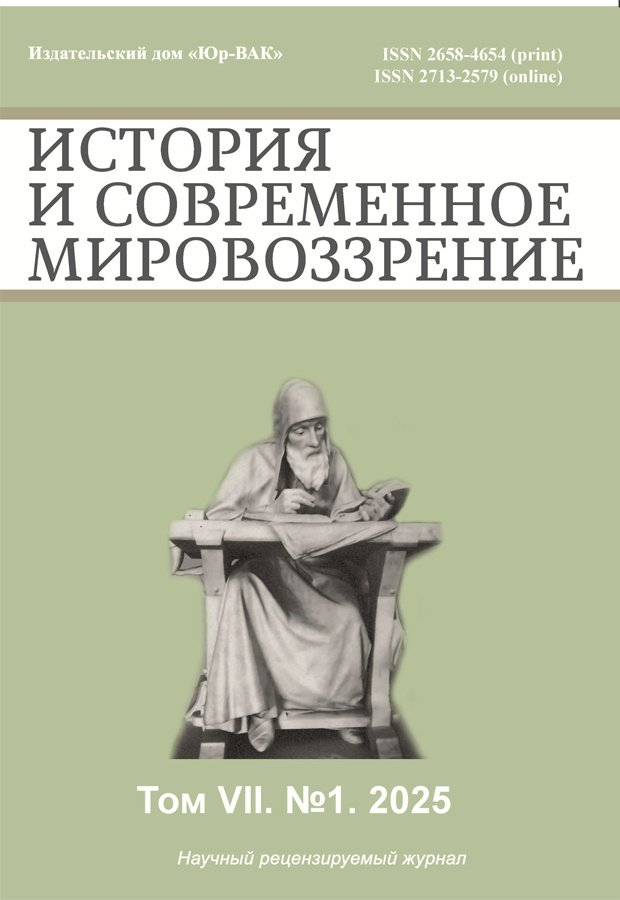Electoral processes in Egypt during the Arab Spring and the role of international institutions in their accompaniment on the example of EISA in 2011–2012
- Autores: Dombrovskiy P.A.1
-
Afiliações:
- Tomsk State University
- Edição: Volume 7, Nº 1 (2025)
- Páginas: 149-157
- Seção: DEBATING ISSUES OF GENERAL HISTORY AND INTERNATIONAL RELATIONS
- URL: https://journals.eco-vector.com/2658-4654/article/view/679586
- DOI: https://doi.org/10.33693/2658-4654-2025-7-1-149-157
- EDN: https://elibrary.ru/QSXEUB
- ID: 679586
Citar
Texto integral
Resumo
The article examines the activities of the Electoral Institute for Sustainable Democracy in Africa (EISA) in Egypt during 2011–2012 as an example of the participation of international and supranational structures in supporting the processes of democratization and political modernization of North African countries to ensure security and stability in the region during and after the revolutionary events of the Arab Spring. The purpose of the work is to determine the role of EISA in the transition of power carried out in the Egyptian state through electoral processes in the designated chronological period. Based on the results of the study, it is recorded that the Institute's field office in Cairo was engaged in organizational and analytical accompaniment aimed at ensuring the transparency and fairness of the ongoing parliamentary and presidential elections, as well as the constitutional referendum. The results of this activity were used, among other things, for making political decisions on the part of the African Union and the structures it supervises regarding Egypt and the processes of transition of power taking place in it.
Texto integral
Sobre autores
Pavel Dombrovskiy
Tomsk State University
Autor responsável pela correspondência
Email: pavel_dombr97@mail.ru
ORCID ID: 0009-0006-8301-9330
Código SPIN: 1756-7419
Junior researcher, teacher; Institute of Education, Tomsk State University; Postgraduate student, Faculty of Historical and Political Science
Rússia, TomskBibliografia
- Abdelrasul E. A. M. A. Revolutionary events in Egypt in 2011–2012s in the context of the Arab Spring: general and special / E. A. M. A. Abdelrasul. Nizhny Novgorod, 2017. 218 p.
- Akhmedov V. Army and politics in Egypt. Middle East and the modernity. 2021. Vol. 55. Pp. 106–114.
- Dombrovskiy P. A. Political Discord in Egypt’s Constitutional Transformation Process in 2012–2013 // History and modern perspectives. 2024. Vol. 6. No 2. P. 126–135.
- Isaev L. M., Korotaev A. V. Egyptian coup in 2013: experience in econometric analysis // Asia and Africa today. 2014. No. 2. Pp. 14–20.
- Isaev L. M. Islamists and the Political Process in Egypt after the Arab Spring // The Arab Crisis and Its International Consequences. M. : Lenand, 2014. Pp. 109–122.
- Karpachova O. V. History of Islamic opposition in Egypt. M. : URSS, 2013. 216 p.
- Korotatev A. V., Isaev L. M. Anatomy of the Egyptian counterrevolution // World economy and international relations. 2014. No. 8. Pp. 91–100.
- Primakov D. Ya. Political and legal grounds for the failure of the 2011 revolution in Egypt // Vestnik of Saint Petersburg University. Law. 2017. Vol. 8. No. 4. Pp. 403–410.
- Razhbadinov M. Z. The anatomy of the Egyptian revolution — 2011: Egypt on the eve and after the political crisis in January-February 2011. M.: Institute of Oriental Studies RAN, 2013. 424 p.
- Sapronova M. A. Electoral processes after the Arab Spring (modification of state institutions in Arab countries using the example of Algeria, Egypt, Libya, Morocco, Syria, Tunisia). M.: Institute of Middle East Studies, 2015. 196 p.
- Tsaregorodtseva I. A. The Muslim Brotherhood and the Government in Egypt: Dialogue or Confrontation? // Asia and Africa today. 2010. № 5(634). Pp. 32–36.
- Anani K. The «Anguish» of the Muslim Brotherhood in Egypt // Routledge Handbook of the Arab Spring: Rethinking Democratization / ed. L. Sadiki. New-York: Routhledge, 2015. Pp. 227–239.
- El Fadl K. A. Failure of a Revolution: The Military, Secular Intelligentsia and Religion in Egypt’s Pseudo-Secular State // Routledge Handbook of the Arab Spring: Rethinking Democratization / ed. L. Sadiki. New-York: Routhledge, 2015. Pp. 253–270.
- Moussa M. Contemporary Islamist Discourses on the State in Egypt: Before and After the Arab Spring // Routledge Handbook of the Arab Spring: Rethinking Democratization / ed. L. Sadiki. New-York: Routhledge, 2015. Pp. 240–252.
- Stepan A., Linz J. J. Democratization Theory and the «Arab Spring» // Journal of Democracy. 2013. Vol. 24. Issue. 2. Pp. 15–30.
Arquivos suplementares









